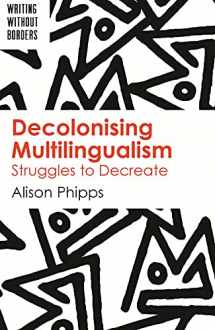
Decolonising Multilingualism: Struggles to Decreate (Writing without Borders, 1) (Volume 1)
Book details
Summary
Description
Review
A powerful call to decolonise knowledge and resist structures of violence through critical, poetic activism, by unlearning, dialoguing, and embodying the pain and potentialities of de-creation across and between languages, times and spaces. ― Elena Fiddian-Qasmiyeh, University College London, UK
Decolonising Multilingualism is a beautifully written, deeply personal and intimate account of what it means to decentre and give up power. None of us can step outside our histories, our skin colour, the structural inequalities that position us in ways that are both privileged and uncomfortable. But by engaging with, and reflecting upon, how these contexts and power relations influence our work with others, this little book is both liberating and challenges us to do better. ― Heaven Crawley, Coventry University, UK
Freire says the role of the colonised is to decolonise the coloniser – Alison Phipps shares her personal journey of such experiences that not only decolonise her but also reveal the hurts and pains of the colonised communities and the gentle wisdom of the lands that offer unconditional healing. These could be stories about courage and vulnerability, but for me I see them as doing what needs to be done: to whakatika (rectify wrongs), with aroha (unconditional love), and discover truth is held in what truly matters – whakapono (faith). ― Piki Diamond, Auckland University of Technology, New Zealand
This is a very timely contribution by Alison Phipps. We live in unprecedented times of divisions. Walls and barriers are raised to keep people and nations apart. People who have so much in common including shared languages. In this book, Alison reminds us of the connecting power of languages and multilingualism. She talks about the languages and traditions left behind by those forced to flee their homes and the rich heritage of languages they can bring to their adopted homes. ― Sabir Zazai, CEO of Scottish Refugee Council, UK
This collection of chapters and musings represents excellent material to prompt discussions with colleagues (both linguists and non-linguists) and with students, in order to keep questioning Whiteness in research, how to unlearn the ways of the academy, how to decreate when we work in classrooms and share knowledge in writing, and how to bridge our learning and teaching selves. -- Camille Jacob, University of Portsmouth, UK ― BAAL News, Issue 117, Summer 2020
With ‘Decolonising Multilingualism: Struggles to Decreate’ Alison Phipps has written a very personal, insightful and passionate account of her efforts to understand the situation of multilingual refugees and migrants and given voice to them. -- Karin Zotzmann, University of Southampton, UK ― Language and Intercultural Communication, 2019
Phipps provides readers with much inspiration on how to do research and teach
multilingually in a more reflexive way. As Phipps applies many of the working practices set out in the opening Manifesto that guides her work, the book provides an excellent example of what decolonising multilingual approaches can constitute in practice. As an early career researcher, I also consider Phipps’ book as symbolically important. Many of us may be struggling with questions relating to working in a ‘decolonised’ way, but may not have the freedom or academic authority to confidently attempt new ways of researching and teaching multilingually. Phipps’ book is a first important step towards reshaping some of our working practices. Having an established academic take the lead can encourage and help emerging scholars find their own answers to some of these difficult issues. -- Wine Tesseur Dublin City University, Ireland ― The Translator, 2019
Decolonising Multilingualism is a potent, passionate, and important warning, an act of witnessing, and a voice of true reason amid the globalized race for profit in linguistic and symbolic commodities. -- David Gramling, University of Arizona, USA ― Critical Multilingualism Studies, 7:3
I


We would LOVE it if you could help us and other readers by reviewing the book
Book review



